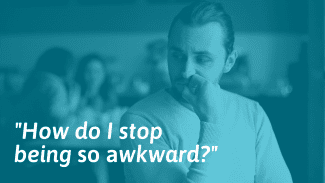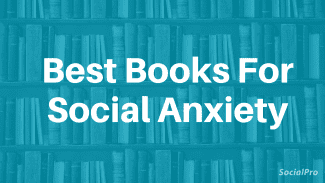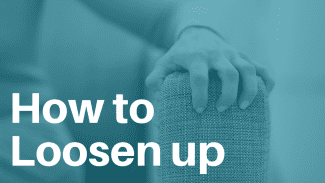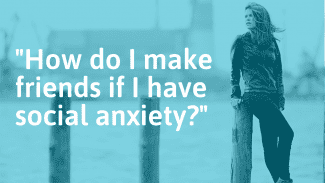“How do I party with social anxiety? I don’t know what sounds worse: going to a club, where I’m supposed to dance, or a party at someone’s house, where I have to talk to a bunch of people I don’t know and make conversation. No matter what I do, I always end up feeling socially awkward!”
Are you asking yourself what to do when you feel awkward at a party? I used to be the same. Whenever I would get invited to a party, I would instantly feel uncomfortable in my stomach. I’d start coming up with excuses for why I couldn’t go. You could say I wasn’t exactly fond of parties.
In this guide, I’ll share what I’ve learned about not being awkward at parties.
1. Focus on things and people around you
Rather than thinking about what people think of you, focus your attention on what’s around you. For example, when you arrive at the party, think about what people look like or what the place looks like. When you’re talking to someone, focus on what they’re saying.
Research shows that focusing on your surroundings like this will make you feel less self-conscious.[1] It will make it easier to come up with things to say, too.
2. Be curious about the person you talk to
Asking people sincere questions helps make the conversations flow better and feel less awkward. It’ll also help you get to know people better.
In between your questions, share related bits and pieces about yourself. That way, people get to know you and feel more comfortable around you. For example, if someone mentions that they went on vacation in Cancun, you can ask something slightly personal:
- Would you live in Cancun if you could, or where would be your dream place to live?
After they’ve shared their thoughts, you can share a little bit about where your dream place would be to live.
Do you see how a sincere question like this makes the conversation more interesting and natural?
See our guide on how to make interesting conversation.
3. Think about some topics in advance
“What if I don’t have anything to talk about?”
Find some safe topics to talk about in advance. You might find that you panic when someone asks you what’s going on. Or maybe you believe that you have nothing to add because things haven’t been going well for you.
Saying “I’ve been reading an excellent book” or “I’m finally managing to grow a plant from an avocado seed after ten attempts” is a perfectly valid thing to say. You don’t have to sound “exciting.”
Read more on what to talk about at a party.
4. Stay sober
“What if I make a fool out of myself?”
Don’t get drunk or high! When we feel stiff and uncomfortable, we may want to use a crutch like alcohol or other drugs. The temptation to knock back a few drinks grows when people around us are also drinking.
A few drinks or puffs from a joint will indeed lower your inhibitions and make you feel more relaxed. But when you’re nervous and in a setting you’re not comfortable with, it can be hard to tell how the drug will hit us. The combination of feeling that we’re not in control of our behavior and in a place you don’t feel comfortable can make us feel even worse.
When you think that you’re embarrassing (say you’ve made a bad joke), remind yourself to breathe and that it’s not the end of the world. Everyone is more concerned with themselves.
5. Set up a plan beforehand
“What if I won’t know anyone there?”
Ask people you know if they will be there before going to the party. Set up a plan of what to do if you get there before people you know arrive.
If it’s a house party, for example, ask if you can help set up. If someone has a birthday or is celebrating another occasion, congratulate them and perhaps ask them some follow-up questions (“Did you receive a present?” or maybe “What will you be doing in your new job?”).
6. Make yourself look approachable
“What if no one will want to talk to me?”
Make yourself look approachable and start talking to other people first! If you’re always on your phone, not smiling, and standing with your arms crossed, people may assume that you don’t want to be at the party or don’t want to talk.
Look more approachable by smiling and keeping your hands visible. Read more tips on how to look approachable.
7. Be attentive in group conversations
“How do I stop being socially awkward in groups?”
Often at parties, you will find yourself in a group of people. Perhaps you’re having a one-on-one conversation, and it’s going well, but then some people join. You start feeling nervous. You might be worried about dividing your attention between several people. Rather than ending up in your own thoughts, pay attention to the conversation. Be attentive, just like when you listen to a close friend.
Simply making eye-contact and humming when appropriate makes others feel like you’re part of the conversation (even if you don’t say much), and it’ll make it easier to be heard when you do have something to add.
See our full guide on how to join a conversation.
8. Change how you think about parties
I thought I disliked parties. But in reality, I disliked feeling awkward at a party and how insecure I would feel during the party and after.
It’s not the parties I actually dislike. It’s my insecurities triggered by the parties that I dislike.
This realization helped me feel more at ease. I realized that if I could work on my insecurity, I could change how I think about parties. It wasn’t a fact that parties were terrible, or that parties and I just couldn’t mix. I just hated the movie that played out in my mind.
We all have subconscious “movies” that play out in our heads with future scenarios.
Someone asks you to speak in front of a group? A movie plays. It shows you forgetting what you were about to say, making a fool out of yourself. As a result, you feel anxious.
In a way, you could say that speaking in front of a group isn’t what makes you anxious. It’s the movie in your head that does. If you knew that you could give a TED-talk worthy speech and get a standing ovation, would it still seem like a horrible nightmare?
The same happens when we think about going to a party. A party might be a great occasion to laugh with our friends, connect to some lovely new people, eat some good food, and enjoy music or other activities.
Instead, a scary movie plays with whatever your biggest fear about parties is. Perhaps it’s awkwardness, being left alone, or not knowing what to say. We might even imagine that people will laugh at us. At the minimum, people will walk away thinking that we’re strange.
It’s easy to see how these mind-movies make sense evolutionarily:
In the old days, if you were just hanging out in a jungle with your Neanderthal buddies when someone asks you to swim across that river, it would be dangerous to get too comfortable. You would have to consider the scary scenarios that might occur. So a movie plays where alligators rip you to pieces, and another one shows you drowning as your friends look on helplessly.
Today, we still have a lot of negative movies. But they often focus on more abstract threats, like “feeling like a failure” rather than “being eaten alive by a predator” or “falling off a cliff.”
What I’ve learned is to pay attention to the exact scenario that the movie shows.
1. Make unconscious scenarios conscious
What does your movie show when you think about parties? What visions do you get in your head? Invest a few seconds into closing your eyes and noticing the scenarios that pop up.
Saw something? Great!
(Notice how you felt a bit uncomfortable by merely looking at those scenarios)
Sometimes our mind plays scenarios that aren’t even realistic. (Like, that everyone will be standing in line laughing at you.) If that happens, try visualizing a more realistic scenario in your head instead. Simply “correcting” your thoughts like this can remind yourself that you’re afraid of something that won’t even happen.
2. Accept that it might get awkward
It’s time to apply the psychological principle of “owning the outcome.” Research shows that when we accept an outcome, it becomes less scary.[1]
Look at the scenarios your mind plays and accept that they might occur. Continue playing them PAST their scary parts, showing how life goes on.
That social awkwardness wasn’t the end of the world. In fact, it wasn’t the end of anything at all. You make a failed joke, and no one laughs. What’s so terrible about that? You end up with no one to talk with for a while. What’s so wrong with that?
When we pull a subconscious monster out of the shadows of our mind, it often turns out it was just a little kitten.
You “own the outcome” when you accept that the scenario might happen. Other negative things will happen. You don’t try to avoid it. You’re okay with it happening. Now, you own it.
3. Create a constructive ending to the worst-case scenario
When that awkward scenario happens, what’s something constructive you can do?
When I visualized how I might end up on my own at a party, I realized that the constructive thing to do would be to relax and look for the people I knew. Eventually, I would find them and rejoin the group.
What would be a constructive response to the scenarios your movies showed? You want to play your constructive response and add it to the movie.
So one of my movies can now look something like this:
I’m at a party. I don’t come up with anything to say. So I’m quiet and feel a bit uncomfortable for a while. Soon, someone else starts talking. The party continues. People have a good time.
(And that’s the worst-case scenario. Not exactly a horror movie anymore).
Thinking about parties now triggers more realistic, less scary movies, and the entire concept of parties suddenly feels a bit more appealing.
9. Find ways to have fun
Now that you have some tools for the most common party problems, it’s time for some tips on how to enjoy yourself.
- Take a look around. See who is in a good mood and looks friendly, who is grumpy, and who looks like they’re trying to have a quiet conversation with a friend. Try to spend time with those who look like they’re open and in a good mood.
- Get yourself a drink as a tool. Pour just half a cup full to start. Remember, it doesn’t have to be an alcoholic beverage. Having a cup in your hand can help you in moments when you feel nervous. You can take a small sip when you need a moment to think. If you want to exit a specific conversation, you can say you want to get another drink.
- Join or start a game. If there’s an option to join some sort of game, try it. It can be an excellent way to relax and get to know people with less pressure on making conversation.
- Be OK with being quiet. You might be criticizing yourself for being quiet and not talking much, but there’s nothing wrong with listening. Some people are more extroverted and feel comfortable sharing stories in groups. In a group setting, everyone can’t be the storyteller. Try to look at it like a quest: what can you ask to make the person in front of you light up and tell a story that you’d be interested in hearing?










“Simply making eye-contact and humming when appropriate”
Humming? Uh wut?
thank you!!!! 🙂
It doesn’t matter if I’m in a great big rave or a little house party with my closest friends and family, the same insecurities still ALWAYS surface. It’s better if I avoid the party in the first place
I can relate to that, thanks! Best advice! ?
Thank you Camilla! 🙂